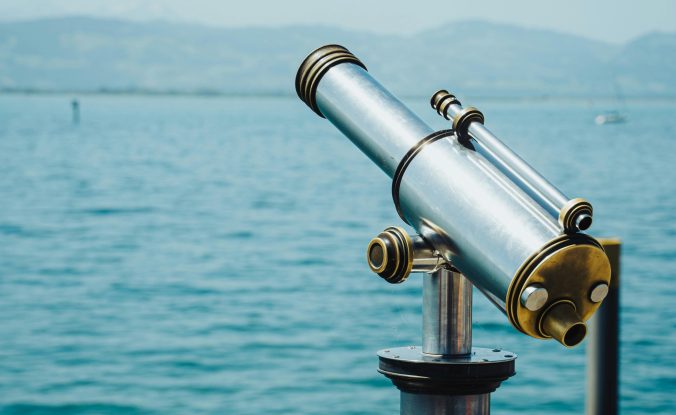There are several tried and true metaphors that try to illustrate how different people view the world. You have rose-colored glasses, living in the rearview mirror, 20/20 vision (which we did not have going into 2020), and hindsight. You could boil them down to mirrors, frames, and lenses. Illustrations help communicate ideas, to view something from a new perspective (like a mirror might do). One of the common warnings is how important it is to live in the present, to not live through your rearview mirror where you’re stuck in the past. Yes, you’re in the present but the focus is on the things that have happened. The good times that happened, the things you wish you could change, the missed opportunities. None of these are bad to reflect on but none of these individually or collectively should be the sole focus. But mirrors aren’t the only things we use to see. What about an older optical device, one that predates cars? Why don’t we hear warnings about living through a spyglass?
We don’t see many people using spyglass in the 21st century but in a bygone era without GPS, cameras, and radio, looking with your eyes was the only way to know where your ship was and where other ships were at. Out at sea, when the ship’s captain wanted to know if the land was near, he had someone in the crow’s nest scanning the horizon with a spyglass and check. (Using the spyglass backward the first time is optional but is sometimes used for humorous effect.) In an age without today’s technology, a spyglass was a valuable tool because the human eye is only so good, and a spyglass helped you see further away.
But how does a spyglass illustrate a way of living? Well, if driving using the rearview mirror is being stuck in the past, and looking around with your own naked eye is living in the moment, then I’d say that living through a spyglass is being fixated on what’s up ahead. It’s when you’re too focused on the future.
I don’t think it’s hard to get stuck living through a spyglass. Dissatisfaction with the present reality of the water around you makes the sight of land, even the thought of it, seem so tantalizing. You want to be on that land, when you have that relationship, that job, that house, that car or gadget. Satisfaction. The captain at sea for weeks on end yearns for land, the soul adrift longs for a more fulfilling future. Plans are made. You want to see the future, what lies ahead, so you dream of what the future holds by looking through a spyglass.
But just like the illustration of trying to drive a car forward by looking backward in the rearview mirror is likely to result in disaster and the reality of living in the past results in missing what’s happening in the present, getting stuck living through the spyglass of the future makes it hard to maneuver up close in the present. You have a great view of what things might look like miles ahead when you get there (if things don’t change by then), but what about that other ship that’s just to starboard? You’ve got no idea it’s there. You’re so focused on such a small part of the horizon, way off in the future. Because you’re so focused on the things you could do years from now, the people you’ll be around, the stuff you’ll have, or the things you could do, you miss the people around you and the things that you can do right now you.
Imagine trying to pilot a ship through a narrow strait. The water is choppy, there are rocks below the surface, the wind is blowing, and it’s raining. And instead of looking at your ship, where you are, you’re looking through a spyglass at the port you can’t wait to dock at. Odds are, you’ll never make it (at least, not on your ship). You’re likely to run around on the rocks and lose your ship.
Is using a spyglass a bad idea? Nope. It’s a useful tool that allows you to see things in the distance, but it’s not a good tool for up close. In tight quarters with bad weather? Eh, probably a good idea just to use it once and a while. It’s useful to check to make sure you’ve still got the right heading, but not for navigating dangerous waters that are close at hand. Pay the most attention to the rocks you need to avoid, and then you’ll get closer to port naturally.
The same in life. Looking ahead to the future is not bad. Making sure your life is heading where you want is smart, as is making sure you’re heading to the waypoints that will get you there. Having a mission and vision to aim for (your heading) with goals mapped out to get you there (your waypoints) is wise. But thinking about the destination without looking around you at where you are won’t end well. Imagine using binoculars while driving a car. It’ll go about as well as driving by the rearview mirror.
A spyglass is a useful tool, just like the rearview mirror. But that isn’t the main way to look around, it’s just a supplemental tool. They aren’t glasses.
So, raise a spyglass to the future and glance backward in the rearview mirror, but don’t get stuck looking through them for too long. Live in the present so you can one day stand on the spot that you once looked at through your spyglass.
There are several tried and true metaphors that try to illustrate how different people view the world. You have rose-colored glasses, living in the rearview mirror, 20/20 vision (which we did not have going into 2020), and hindsight. You could boil them down to mirrors, frames, and lenses. Illustrations help communicate ideas, to view something from a new perspective (like a mirror might do). One of the common warnings is how important it is to live in the present, to not live through your rearview mirror where you’re stuck in the past. Yes, you’re in the present but the focus is on the things that have happened. The good times that happened, the things you wish you could change, the missed opportunities. None of these are bad to reflect on but none of these individually or collectively should be the sole focus. But mirrors aren’t the only things we use to see. What about an older optical device, one that predates cars? Why don’t we hear warnings about living through a spyglass?
We don’t see many people using spyglass in the 21st century but in a bygone era without GPS, cameras, and radio, looking with your eyes was the only way to know where your ship was and where other ships were at. Out at sea, when the ship’s captain wanted to know if the land was near, he had someone in the crow’s nest scanning the horizon with a spyglass and check. (Using the spyglass backward the first time is optional but is sometimes used for humorous effect.) In an age without today’s technology, a spyglass was a valuable tool because the human eye is only so good, and a spyglass helped you see further away.
But how does a spyglass illustrate a way of living? Well, if driving using the rearview mirror is being stuck in the past, and looking around with your own naked eye is living in the moment, then I’d say that living through a spyglass is being fixated on what’s up ahead. It’s when you’re too focused on the future.
I don’t think it’s hard to get stuck living through a spyglass. Dissatisfaction with the present reality of the water around you makes the sight of land, even the thought of it, seem so tantalizing. You want to be on that land, when you have that relationship, that job, that house, that car or gadget. Satisfaction. The captain at sea for weeks on end yearns for land, the soul adrift longs for a more fulfilling future. Plans are made. You want to see the future, what lies ahead, so you dream of what the future holds by looking through a spyglass.
But just like the illustration of trying to drive a car forward by looking backward in the rearview mirror is likely to result in disaster and the reality of living in the past results in missing what’s happening in the present, getting stuck living through the spyglass of the future makes it hard to maneuver up close in the present. You have a great view of what things might look like miles ahead when you get there (if things don’t change by then), but what about that other ship that’s just to starboard? You’ve got no idea it’s there. You’re so focused on such a small part of the horizon, way off in the future. Because you’re so focused on the things you could do years from now, the people you’ll be around, the stuff you’ll have, or the things you could do, you miss the people around you and the things that you can do right now you.
Imagine trying to pilot a ship through a narrow strait. The water is choppy, there are rocks below the surface, the wind is blowing, and it’s raining. And instead of looking at your ship, where you are, you’re looking through a spyglass at the port you can’t wait to dock at. Odds are, you’ll never make it (at least, not on your ship). You’re likely to run around on the rocks and lose your ship.
Is using a spyglass a bad idea? Nope. It’s a useful tool that allows you to see things in the distance, but it’s not a good tool for up close. In tight quarters with bad weather? Eh, probably a good idea just to use it once and a while. It’s useful to check to make sure you’ve still got the right heading, but not for navigating dangerous waters that are close at hand. Pay the most attention to the rocks you need to avoid, and then you’ll get closer to port naturally.
The same in life. Looking ahead to the future is not bad. Making sure your life is heading where you want is smart, as is making sure you’re heading to the waypoints that will get you there. Having a mission and vision to aim for (your heading) with goals mapped out to get you there (your waypoints) is wise. But thinking about the destination without looking around you at where you are won’t end well. Imagine using binoculars while driving a car. It’ll go about as well as driving by the rearview mirror.
A spyglass is a useful tool, just like the rearview mirror. But that isn’t the main way to look around, it’s just a supplemental tool. They aren’t glasses.
So, raise a spyglass to the future and glance backward in the rearview mirror, but don’t get stuck looking through them for too long. Live in the present so you can one day stand on the spot that you once looked at through your spyglass.


